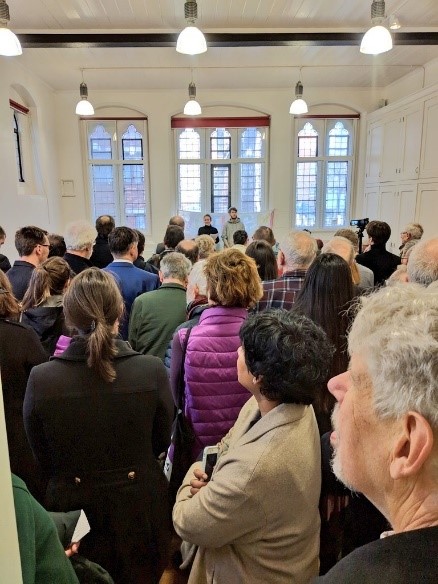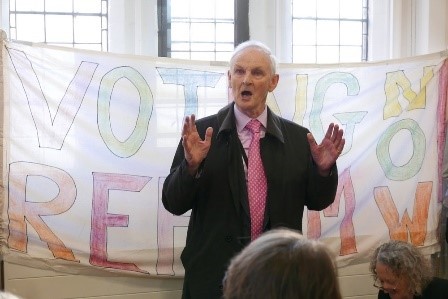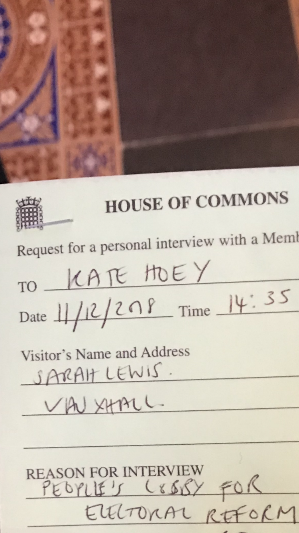February 2019 Newsletter
Paul Tyler speaks out: Make Votes Matter People's Lobby for Electoral Reform
On Tuesday 11th December, LDER representatives joined more than 100 other activists from around 65 constituencies attending the People's Lobby for Electoral Reform, organised by Make Votes Matter. The purpose of the event was to lobby parliamentarians for a change in the system that elects MPs to the House of Commons and to raise visibility, both around Westminster and online, of the urgent need for electoral reform. The event took place on the day that the meaningful vote on the Prime Minister's deal with Europe was due to take place - and was later cancelled.

We kicked off with an address by Lord Paul Tyler, Liberal Democrat Spokesperson for Constitutional and Political Reform. Lord Tyler made a compelling case for it being a "very good time" to be lobbying for electoral reform. He noted that the 'Brexit' crisis has undermined the claim that our current system provides "strong and stable", decisive, government.

Participants then met in their constituency groups and headed to the House of Commons to lobby their MPs. Those of us who were unable to secure a meeting with our MPs made sure it was known that we had requested one.

The lobby concluded with remarks from Caroline Lucas, Stephen Kinnock and Vince Cable. Baroness Sal Brinton was awarded a Parliamentary Champion Award - awarded to cross-party politicians who have done the most to campaign for a proportional voting system in the UK.
Make Votes Matter will continue to focus on securing support for proportional representation from the Labour Party, as well as supporting activist groups across the UK.
You can view the highlights of the event, including remarks from Lord Tyler and Vince Cable here
Snap General Election? Getting prepared
With another snap General Election a possibility, we have updated our submission to the last manifesto and sent it to party HQ.
Our policy priorities are:
- Immediate introduction of STV for council elections in England.
- A Constitutional Convention or Citizens Assembly to cover UK level reform, including PR/STV for Westminster elections and reform of the House of Lords.
These should be 'red lines' in any post-election negotiations.
Also:
- Votes at age 16 for all UK elections.
- Take big money out of politics: cap donations to political parties at £10,000 per person each year; and full disclosure of all political donations.
- A UK-wide lobbying register.
- Increase the resources, scope and sanctions of the Electoral Commission.
Prioritising reform: Meeting with Lord Paul Tyler, Liberal Democrat Spokesperson for Constitutional and Political Reform
Following Lord Tyler's speech at the December Make Votes Matter lobby and our policy submission to HQ, LDER Exec members Keith Sharp and Sarah Lewis met Lord Tyler to discuss prioritising our policies.
Lord Tyler said our policy proposals would be supported, but that there is a question regarding the level of priority given to electoral and political reform (it was high priority in our 2010 manifesto but has since dropped down the order).
We represented LDER's position that in cross-party negotiations electoral reform must be given the priority it deserves - as 'the reform that makes all other reforms possible'.
Lord Tyler noted that it would be critical to see how the Party's General Election manifesto would translate into a core narrative or message going into any future election. We discussed 'Politics is broken and we can fix it' as a potential narrative plank for any early election, where potential components of such a campaign platform could include:
- Electoral reform
- Money in politics
- House of Lords reform
- Further devolution
- The relationship between the legislature and the executive
Lord Tyler noted the upcoming opportunity to push for electoral reform in the Welsh Assembly, drawing on the powerful evidence from Scotland to show that alternative electoral systems can deliver better results from a voter's perspective. He also mentioned that the prospect of boundary changes was also an advocacy opportunity. We agreed to remain closely connected on the question of the Party narrative and to consider LDER's role across this broader agenda.
Lord Tyler also suggested that LDER looks to work with the Local Government Association and ALDC to find ways to support campaign work across the UK, potentially providing additional content and an up to date evidence base. We will explore this.
Finally, he kindly recorded a short video, which can now be found on LDER's website and Facebook page.
You may also be interested in Lord Tyler's recent piece in The Independent on how quickly a People's Vote could be put in place.
The public supports change: new ComRes polling
Some recent ComRes polling has revealed a strong appetite for political reform in the UK. They found that:
- 72% of adults agree the Brexit process has shown that the British political system needs a complete overhaul.
- 72% support having a written Constitution.
- 62% want more decisions to be made at local level rather than by Parliament.
Your view please! Conventions/Assemblies
Following our last newsletter, we'd welcome your views on using deliberative democracy, perhaps especially citizens' assemblies, as a key change to our politics and a required route to the holding of any further referendums. The Brexit shambles has shown the inadequacy of the present party system, with its whipping and cajoling of MPs to vote the way the party wants, rather than in accordance with their beliefs and judgement. It's in our key policy demands - further views please!
